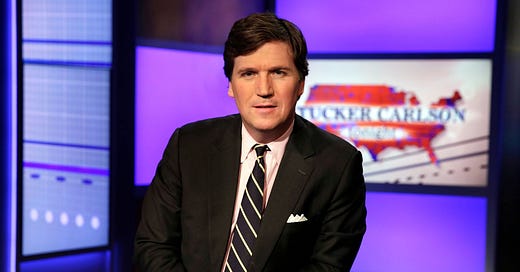Tucker Carlson: What He Says People Have to Learn and Know to be Informed
Carlson, love him or hate him, or indifferent, does bring up good points on occasion.
I don’t always agree with Tucker Carlson and at the same time, I don’t think that he’s as worthless as a communicator and person as many critics believe. He’s smarter and more honest (at times) than judged.
I recently came across a tweet where Carlson communicated the following piece of accurate analysis and useful wisdom:
“The first step is knowing what’s actually happened and that’s not easy. Who’s an ally and who’s an enemy? You can’t always tell. What’s true and what’s a lie? Sometimes it’s hard to know. There’s so much deception.”
Regardless of where one resides on the socio-political spectrum, there are certain facts, evidence, proof and truths about emotions, psychology, behavior and society.
We don’t always learn what has happened, either from the media or fellow citizens. And even if we have the facts, we can struggle with understanding and putting puzzle pieces together. Who is an “ally” for the truth, whatever it is, and who’s an “enemy?”
Carlson is on point and absolutely factual when he says, “you can’t always tell.”
What’s true and what’s a lie isn’t always obvious or simple to discern and even when it seems to be, there might be emotional assumptions ruling over truth. It is, as Carlson says, “hard to know.”
It’s difficult to argue that there isn’t an abundance of deception. It comes from a variety of voices on a regular basis in different areas of life.
Sometimes, people we may not trust or like communicate hard truths. These people — and maybe what they are saying — are difficult to listen to or read and digest yet that doesn’t make what is communicated any less important, factual and valuable.
It’s a hard-earned, helpful skill to learn to separate the content of a person’s words from how we judge them as human beings. Not everyone develops this skill because emotions and feelings can be so strong and arduous to manage and overcome.
Of course, being worthy of trust and having a reputation for being trustworthy is vital. It is also true that people of questionable or poor character — real or perceived — still might be giving us what is necessary to know to be fully, objectively informed.
This is not to say that Carlson is beyond reproach or that what he says is not distorted, self serving and deceptive at times. He’s admitted to it. It is to say however that what he expressed in this instance is smart and useful to know.
Michael Toebe is a reputation consultant, advisor and communications specialist at Reputation Quality, assisting individuals and organizations with further building reputation as an asset or ethically protecting, restoring or reconstructing it.
Promote yourself, business and offering in Reputation Intelligence with a color ad or audio or video clip and a link or two. For an ad placement in one issue: $500. For a month of placements in every article: $2,500.






